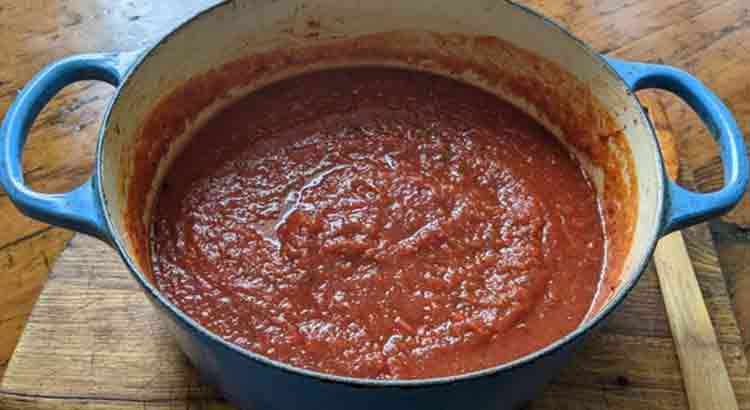If you’ve ever wondered whether cooking pizza sauce makes a difference in taste, you’re in the right place. In this article, we’ll dive into the age-old debate of whether you should cook your pizza sauce or leave it uncooked. We’ll explore the reasons why cooking can enhance the flavors and discuss why some pizza enthusiasts prefer the freshness of uncooked sauce.
In this article, we’ll weigh the pros and cons of cooking pizza sauce and explore the impact it can have on the final product. Whether you’re a cooking enthusiast or a fan of raw flavors, we’ll provide insights and tips to help you decide which approach best suits your taste buds. So, let’s settle in, grab a slice of pizza, and get ready to unravel the mystery of cooking pizza sauce. Are you ready to embark on this saucy journey with us? Let’s dive in!
Why You Should Cook Pizza Sauce
Cooking pizza sauce has its advantages when it comes to enhancing the flavors and creating a more delicious pizza. By cooking the sauce, you allow the ingredients to blend together and develop a richer, more robust taste. The heat from cooking helps to break down the tomatoes, releasing their natural sweetness and intensifying their flavor. Additionally, cooking the sauce can help to thicken it, making it easier to spread evenly on the pizza dough.
When you cook pizza sauce, you also have the opportunity to infuse it with aromatic herbs and spices. Adding ingredients like garlic, oregano, basil, and red pepper flakes can elevate the taste profile of the sauce, creating a more complex and satisfying flavor. These herbs and spices have the chance to meld together and infuse the sauce during the cooking process, resulting in a well-rounded and flavorful base for your pizza.
In summary, cooking pizza sauce allows for the flavors to develop and intensify, creating a tastier and more enjoyable pizza experience. The process of cooking helps to meld the ingredients together, release the natural sweetness of the tomatoes, and infuse the sauce with aromatic herbs and spices, ultimately resulting in a rich and flavorful sauce that will take your pizza to the next level.
Why You Shouldn’t Cook Pizza Sauce
While cooking pizza sauce has its merits, there are also reasons why you might choose not to cook it. One main consideration is the freshness and quality of the ingredients. If you have access to high-quality, fresh tomatoes and other ingredients, you may prefer to make a raw sauce that preserves the natural flavors and textures of the ingredients. A raw sauce can provide a bright and vibrant taste, which some pizza enthusiasts prefer.
Another factor to consider is the desired consistency of the sauce. If you prefer a thinner, more liquid sauce, cooking it may not be the best option. Cooking can thicken the sauce, making it more suitable for spreading on the pizza dough, but if you prefer a lighter and more delicate sauce, a raw version might be more appropriate.
Cooked vs. Uncooked Pizza Sauce
When it comes to cooked versus uncooked pizza sauce, the choice boils down to the flavor profile you prefer and the texture you want to achieve. Cooked pizza sauce tends to have a richer and more concentrated flavor. The heat from cooking helps to intensify the natural sweetness of the tomatoes and allows the ingredients to meld together, creating a well-rounded taste. If you enjoy deep, robust flavors in your pizza sauce, then cooking it is the way to go.
On the other hand, uncooked pizza sauce offers a fresher and brighter taste. By using raw ingredients, you preserve the natural flavors and textures of the tomatoes and other components. The sauce retains a certain lightness and vibrancy that can be appealing, especially if you prefer a more delicate and subtle flavor in your pizza. Uncooked sauce is a great choice when you have access to high-quality, fresh tomatoes and want to showcase their natural taste.
In the end, whether you choose to cook or leave your pizza sauce uncooked depends on your personal preference. If you’re looking for a bolder and richer flavor, opt for cooking the sauce. If you prefer a fresher and lighter taste, go for the uncooked version. Feel free to experiment and find the style that best suits your palate.
Best Canned Tomatoes to Use for Pizza Sauce
When making pizza sauce, the choice of canned tomatoes can greatly impact the flavor and quality of the sauce. Look for canned tomatoes that have been specifically labeled as “San Marzano” or “Italian-style” tomatoes. San Marzano tomatoes, grown in the volcanic soil near Mount Vesuvius in Italy, are known for their sweet, rich flavor and low acidity. They are considered the gold standard for making authentic and delicious pizza sauce.
If you can’t find San Marzano tomatoes, Italian-style canned tomatoes are a great alternative. These tomatoes are typically vine-ripened and have a similar flavor profile to San Marzano tomatoes. Look for brands that prioritize quality and use whole, peeled tomatoes. Avoid tomatoes that are overly processed or contain added sugars or preservatives.
Remember, using high-quality canned tomatoes is key to achieving a flavorful pizza sauce. Take the time to read labels and choose reputable brands that prioritize taste and authenticity.
Best Condiments for Pizza Sauce
While pizza sauce can be delicious on its own, adding condiments can take it to new heights of flavor. Here are a few popular condiments that complement pizza sauce:
- Garlic: Adding minced or roasted garlic to your pizza sauce can infuse it with a savory and aromatic kick. Garlic adds depth and complexity to the sauce, enhancing its overall taste.
- Oregano: A classic herb in Italian cuisine, oregano brings a distinctive and earthy flavor to pizza sauce. Whether using dried or fresh oregano, it adds a delightful herbal note that pairs well with the other ingredients.
- Red Pepper Flakes: If you enjoy a hint of heat, red pepper flakes are a fantastic addition to pizza sauce. They provide a subtle spiciness that adds excitement and depth to each bite.
- Basil: Fresh basil leaves or dried basil can lend a sweet and slightly minty flavor to the sauce. It adds freshness and a touch of sweetness that complements the tomatoes beautifully.
Remember, these condiments are just suggestions, and you can mix and match them according to your taste preferences. Don’t be afraid to experiment and create your own unique flavor combinations to make your pizza sauce truly stand out.
How to Sauce a Pizza
Saucing a pizza may seem like a simple task, but there are a few key techniques to ensure that your sauce is evenly distributed and enhances the overall flavor of your pizza. Here’s a step-by-step guide on how to sauce a pizza:
- Start with a pre-baked pizza crust or raw dough. If you’re using a pre-baked crust, skip to step 3.
- If you’re working with pizza dough, roll it out into your desired shape and thickness. Place it on a pizza stone or baking sheet lined with parchment paper.
- Take a ladle or large spoonful of pizza sauce and place it in the center of the dough.
- Using the back of the spoon, gently spread the sauce in a circular motion, starting from the center and working your way outwards. Be sure to leave a small border around the edges for the crust.
- Continue spreading the sauce until it covers the entire surface of the dough evenly. Aim for a thin, even layer of sauce to prevent the pizza from becoming overly soggy.
- If desired, sprinkle some grated cheese or other toppings directly onto the sauce before adding additional toppings.
Remember, practice makes perfect when it comes to saucing a pizza. Don’t be discouraged if it takes a few tries to achieve the desired result. With time and experience, you’ll become more proficient at creating a beautifully sauced pizza.
How Long Does Pizza Sauce Last
Pizza sauce, like many other food items, has a limited shelf life. It’s important to store it properly and be mindful of its expiration date to ensure that it stays fresh and safe to consume. Here are some general guidelines on how long pizza sauce lasts:
- Unopened store-bought pizza sauce: Most commercially produced pizza sauces have a shelf life of about 1 to 2 years when stored in a cool, dry place, such as a pantry or cupboard. However, it’s always best to check the expiration date printed on the packaging.
- Opened store-bought pizza sauce: Once you open a jar or bottle of pizza sauce, it’s recommended to refrigerate it and use it within 7 to 10 days. Be sure to store it in an airtight container to maintain its freshness and quality.
- Homemade pizza sauce: If you make your own pizza sauce from scratch, it typically lasts for about 5 to 7 days when refrigerated in a sealed container. However, the shelf life may vary depending on the ingredients used and the cooking process. Always inspect the sauce for any signs of spoilage, such as mold or off odors, before consuming.
To maximize the shelf life of pizza sauce, it’s important to handle it hygienically, store it at the correct temperature, and be mindful of any changes in texture, smell, or appearance. When in doubt, it’s best to err on the side of caution and discard the sauce if you suspect it may be spoiled.
In summary, unopened store-bought pizza sauce can last up to 1 to 2 years, while opened sauce should be used within 7 to 10 days. Homemade pizza sauce typically stays fresh for about 5 to 7 days when refrigerated. Always check for signs of spoilage and follow proper storage guidelines to ensure the sauce remains safe to consume.
Final Thoughts
Whether you choose to cook or leave your pizza sauce uncooked, it ultimately comes down to personal preference and the flavor profile you desire. Cooking the sauce can intensify the flavors and create a richer taste, while leaving it uncooked preserves the freshness and brightness of the ingredients. Consider experimenting with both methods to find the one that suits your palate and brings you the most enjoyment.
When it comes to choosing canned tomatoes for pizza sauce, opt for San Marzano or Italian-style tomatoes for their superior flavor. These tomatoes provide a sweet and rich taste that elevates your sauce. Look for reputable brands that prioritize quality and avoid overly processed options. Investing in high-quality canned tomatoes will make a noticeable difference in the final taste of your pizza sauce.
Lastly, when saucing a pizza, spread the sauce evenly and thinly on the dough, leaving a small border for the crust. This ensures that the sauce complements the other toppings and doesn’t overpower the overall flavor. Remember to store your pizza sauce properly, whether it’s store-bought or homemade, and pay attention to its expiration date to ensure freshness and safety.
Whether you’re a fan of cooked or uncooked pizza sauce, the key is to enjoy the process of creating your own delicious pizza. Let your taste buds guide you as you experiment with different flavors and techniques to find the perfect sauce that will take your homemade pizza to the next level. Happy saucing and happy pizza making!

